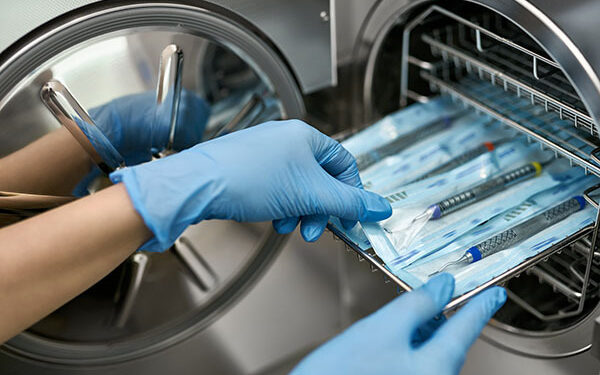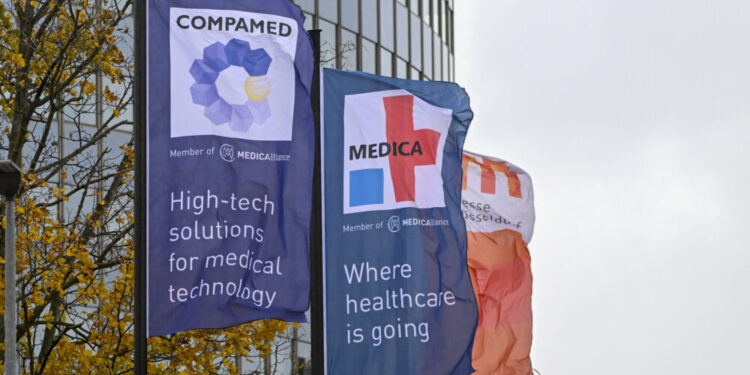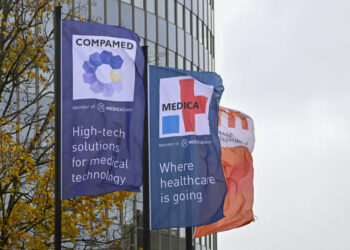
Sterilization is described as a complete elimination or destruction of all microbial life forms, carried out by various methods using sterilization equipment.
Medical devices are sterilized in various ways, including using moist heat (steam), dry heat, radiation, ethylene oxide gas, vaporized hydrogen peroxide, and other methods (for example, chlorine dioxide gas, vaporized peracetic acid, and nitrogen dioxide).
Sterilization is a fundamental element of infection control measures in hospitals. Many hospitals perform various surgeries every day. More invasive procedures are being conducted at various medical facilities. Medical devices or surgical instruments that encounter the patient’s sterile tissue or mucous membranes during different approaches are associated with an increased risk of introducing the pathogen into the patient’s body. In addition, there is the potential for patient-to-patient transmission of infection, from the patient or to medical staff and vice versa (e.g., hepatitis B virus), or through improperly sterile or disinfected products, from the patient’s environment (e.g., Pseudomonas aeruginosa, Acinetobacter, etc.). Hospitals have reported numerous outbreaks and infections from improperly sterilized equipment. Many infectious diseases have been reported worldwide due to contaminated endoscopes. Therefore, all medical facilities require appropriate decontamination techniques for medical and surgical equipment. Healthcare providers are responsible for reducing and eliminating such infections.
The sterilization process is widely used across pharma & biotech companies, medical devices companies, research laboratories, food & beverage companies, ambulatory settings, infection control service providers, etc. In healthcare, there is a huge demand for innovative medicines and therapeutic procedures for disease treatment, leading to a rise in R&D activities in research laboratories and pharma & biotech companies which, in turn, drive the sterilization equipment market growth. In the modern lifestyle, preserved food and beverage consumption is rising. The industry players are following sterilizing procedures to avoid contamination and protect the items for an extended period.
The global sterilization equipment market is expected to reach USD 15.6 billion by 2030, registering a CAGR of 10.5%. The rising incidence of Hospital Acquired Infections (HAIs), impact of the COVID-19 outbreak, and the increasing number of surgical procedures are the key driving factors of the market.
The recent outbreak of COVID-19 is anticipated to significantly impact the market. The pandemic caused by the virus SARS-CoV-2 has drastically increased the demand for medicines, emergency supplies, and hospital equipment including gowns, antiseptics, and disinfectant products.
The COVID-19 outbreak and increasing hospital admissions across the globe have significantly increased the demand for sterilization equipment. Consequently, the use of sterilization equipment has also increased due to the increasing number of patients in hospitals & clinics.
Proper and regular sterilization of medical devices is one of the essential requirements for treating patients suffering from COVID-19. In such cases, demand for sterilization equipment is anticipated to increase, which is in turn expected to propel the market growth. Therefore, the outbreak of COVID-19 is a high-impact rendering driver for this market.
A medical device maker recalled thousands of sterilization containers after finding they may not keep tools sterile, risking patients getting infections.
A medical-device maker issued a recall of some sterilization containers over potential breaches.
The WSJ reported Becton Dickinson found evidence the breaches could lead to patient infections.
It applies to 17 versions of the reusable metal containers, sold under the Genesis Sterrad brand.
Medical-device maker Beckton Dickinson has issued a voluntary recall of some sterilization containers, fearing that breaches in the containers could lead to an increased risk of patient infections.
The Wall Street Journal reported the story citing a company letter sent to customers this week.
Becton Dickinson found evidence some containers, sold under the Genesis Sterrad brand in the United States and Canada, used to sterilize surgical instruments may have had breaches.
The company said the 17 versions of the reusable metal containers haven’t consistently met testing requirements for a quality test known as an aerosol challenge in 2011, in which the containers are exposed to aerosolized microbes to see whether they penetrate the container.
The failing tests mean the containers won’t keep surgical tools sterile, which “might lead to transmission of infectious pathogens to the surgical patient,” potentially causing fevers, chills, abscess formation, or sepsis, according to the letter obtained by the Journal.
A Becton Dickinson spokesperson told the outlet that about 8,075 Genesis containers are being recalled, including 6,777 in the US, and confirmed the containers were discontinued earlier this year.
Becton Dickinson did not immediately respond to a request for comment from Insider made outside regular business hours Saturday.
The medical-device maker also said there have been no reports of adverse events associated with this issue and shared the test results with the Food and Drug Administration.
The FDA didn’t immediately respond to Insider’s request for comment, which was made outside regular business hours Saturday.
The company, which acquired the Genesis Sterrad line of reusable containers in 2015 as part of its $12 billion takeover of CareFusion Corp, told Reuters: “It is very unlikely that a number of products are still in use, as most hospitals have moved away from these discontinued Sterrad systems over the past several years.”



















